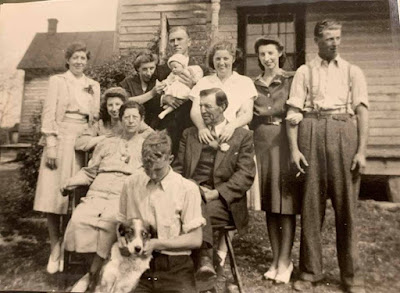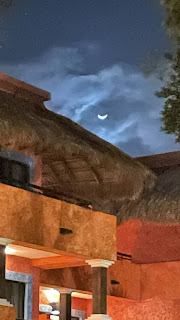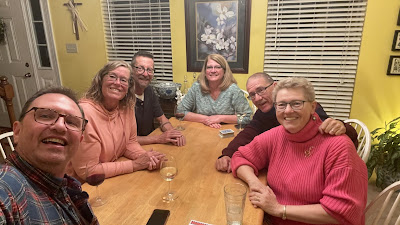31 March 2021
Gerhard and Walther
Patristic Quote of the Day
Catechesis: Law and Gospel
30 March 2021
Gerhard and Walther
Patristic Quote of the Day
Catechesis: Law and Gospel
29 March 2021
Gerhard and Walther
Patristic Quote of the Day
Catechesis: Law and Gospel
28 March 2021
Easter is...
Palm Sunday Homily
People loved by God, because we have spent the Lenten Midweeks meditating on the Holy Passion, today’s sermon will not deal with that, but we’ll return to the joy we had at the beginning of the service: the Palm Sunday Gospel from St. Matthew 21 and meditate our way through that together. Before we begin, though, would you join me in prayer? Lord God, heavenly Father, we ought always to thank and praise and glorify You that You appointed Your Son as King and Savior to rescue us from the tyranny of sin and death. Enlighten, direct and lead us by Your Holy Spirit so that we always cling to this King and joyfully sing His praises throughout our days here in this world and finally with all the saints around Your throne. We ask it in His holy name. Amen.
Matthew 21:1 Now when they drew near to Jerusalem and came to Bethphage, to the Mount of Olives, then Jesus sent two disciples, 2 saying to them, “Go into the village in front of you, and immediately you will find a donkey tied, and a colt with her. Untie them and bring them to me. 3 If anyone says anything to you, you shall say, ‘The Lord needs them,’ and he will send them at once.” You may not know what meets you at the bend in the road, on the other side of the hill, or further down the pike. But that was never the case with Jesus. He always knows what is up ahead, for him and for his disciples and so for you and me. And He’d been telling them what’s up ahead for Him for a long time now: about the sufferings that awaited in Jerusalem and then the glory of the resurrection. And so to inaugurate that holy week when the Lamb of God would suffer and die for the sins of the world and so trounce death and leave it in the dust, He plans a little surprise. A parade. Over and over again, we’ve heard Jesus tell people in the Gospels: “Hush. Don’t tell anyone who I am.” But that’s all at an end now. He’s preparing to show the whole world who He is. And so He sends two of the disciples to find that donkey and colt that he knows are there and just waiting, and to bring them to him.
4 This took place to fulfill what was spoken by the prophet, saying, 5 “Say to the daughter of Zion, ‘Behold, your king is coming to you, humble, and mounted on a donkey, on a colt, the foal of a beast of burden.’” Echoes here, people loved by God, of an earlier Son of David who rode David’s mule into Jerusalem to shouts of “Long live King Solomon!” And back then that served notice to the man who was trying to usurp the throne that the real King had just been revealed to Israel. The sacred writers tell us that the people went up after Solomon with music and singing and joy. The noise was so raucous that it shook the earth. And then centuries later, the prophet Zechariah foretells a divine re-do as we heard in the first reading! That’s when THE promised Son of David, THE true King of God’s people, would arrive in much the same way. Humble. Mounted on a donkey, And joy would be everywhere that day, when King JESUS rides the ass into His holy City.
6 The disciples went and did as Jesus had directed them. 7 They brought the donkey and the colt and put on them their cloaks, and he sat on them. Smart move. Do what Jesus tells you to! I remember wondering how Jesus rode on them both “and,,,he sat on them.” He may indeed have ridden first one, then the other. The Fathers thought that was a way of saying He came for Israel—the “broken in” ass—and for the Gentiles, —the colt which had not yet been ridden. Barb Brase one day pointed out the obvious to me that I had somehow missed: “He sat on THEM.” The reference to the them, there, is probably “their cloaks” rather than donkey and her colt. The disciples’ clothes form a sort of saddle for him.
8 Most of the crowd spread their cloaks on the road, and others cut branches from the trees and spread them on the road. Like the story of Sir Walter Raleigh before Queen Elizabeth the First: Jesus’ red carpet welcome, if you will. You can see them coming off and lining the street as the donkey and colt are led along with Jesus astride one or the other crests the Mount of Olives and begins His descent.. But also “branches from the trees.” Only St. John mentions that the branches were palms.
9 And the crowds that went before him and that followed him were shouting, “Hosanna to the Son of David! Blessed is he who comes in the name of the Lord! Hosanna in the highest!” And so we come at last to the most important part of this whole Gospel. They are basically singing from Psalm 118.
Hosanna is just the Hebrew way of shouting: “Save us now!” So what were they thinking? That He was riding into His holy City to lead the revolt that would fling the Romans across the Mediterranean back to where they came from ? That He’d come to be the kind of Savior that fixes the stuff that goes wrong in your life here? He did do plenty of that in His ministry, of course: healing the sick, driving out demons, even raising the dead to life. But now, now He’s come to His great moment to actually answer that prayer: “Save us now.” Later, as you just heard, they’d cry: “Save yourself and come down from the Cross.” His silence is His answer: “No, I’d rather stay here and save YOU.” What you need is not some temporary fix. What you need is a sacrifice of atonement that can wipe out sins forever and that is what he comes to provide.. Psalm 118 again: “Bind the festal sacrifice with cords up to the horns of the altar.” HE’S the festal sacrifice and the altar is the Cross. That’s where Your King will reign in a sacrifice of love so breathtakingly amazing that it will capture the hearts of men and women of every nation and century, and make them love Him forever.
And so as often as you catch the first glimpse of Him coming into our midst with His life-giving gifts, you can’t help but break into your hosannas and blessed is he’s, joining the church of all ages in welcoming the King. Your King. And it’s almost like we stutter with joy getting the words out: “Hosanna, Hosanna, Hosanna in the highest! Blessed is He! Blessed is He! Blessed is He that cometh in the name of the Lord!”
So here is present joy: Your King comes to you today. And very shortly His body and His blood will go into you. Forgiveness that wipes out of all your sin. The pledge of His undying love for you.. Today you get to join the crowds in the raucous “Hosanna” and “Blessed is he!” Today. Let it rip!
The King comes. Welcome Him with gladness, that we may attain unto the good things that He has promised us, by His grace and love towards mankind, to whom be glory and dominion, now and ever, world without end. Amen.
Marathon Weekend
27 March 2021
Russian Novelists...
Gerhard and Walther
Patristic Quote of the Day
Catechesis: Good Works
26 March 2021
Gerhard and Walther
Patristic Quote of the Day
Catechesis: Good Works
Since it’s coming up this week...
25 March 2021
Mother, not Goddess
Christ is the Mediator, Christ is the bridge that we cross to turn to the Father (see Catechism of the Catholic Church, 2674). He is the only Redeemer: there are no co-redeemers with Christ. He is the only one. He is the Mediator par excellence. He is the Mediator. Each prayer we raise to God is through Christ, with Christ and in Christ and it is fulfilled thanks to his intercession. The Holy Spirit extends Christ’s mediation through every time and every place: there is no other name by which we can be saved: Jesus Christ, the only Mediator between God and humanity (see Acts 4:12).
. . .
Jesus extended Mary’s maternity to the entire Church when He entrusted her to his beloved disciple shortly before dying on the cross. From that moment on, we have all been gathered under her mantle, as depicted in certain medieval frescoes or paintings. Even the first Latin antiphon – sub tuum praesidium confugimus, sancta Dei Genitrix: the Madonna who ‘covers’, like a Mother, to whom Jesus entrusted us, all of us; but as a Mother, not as a goddess, not as co-redeemer: as Mother. It is true that Christian piety has always given her beautiful titles, as a child gives his or her mamma: how many beautiful things children say about their mamma whom they love so much! How many beautiful things. But we need to be careful: the things the Church, the Saints, say about her, beautiful things, about Mary, subtract nothing from Christ’s sole Redemption. He is the only Redeemer. They are expressions of love like a child for his or her mamma – some are exaggerated. But love, as we know, always makes us exaggerate things, but out of love.
Gerhard and Walther
Patristic Quote of the Day
Catechesis: Good Works
24 March 2021
And Cindi had a very happy “hunting” day...
Vacation Reflections
Ah, Spring!
Gerhard and Walther
Patristic Quote of the Day
Catechesis: Righteousness of Faith
23 March 2021
Gerhard and Walther
Patristic Quote of the Day
Catechesis: The Righteousness of Faith
22 March 2021
Gerhard and Walther
Patristic Quote of the Day
Catechesis: Righteousness of Faith
21 March 2021
How is it possible
Gerhard and Walther
Patristic Quote of the Day
Catechesis: Righteousness of Faith
20 March 2021
Gerhard and Walther
Patristic Quote of the Day
Catechesis: Righteousness of Faith
19 March 2021
Homily for St. Joseph’s Day
Who's the carpenter here? David wanted to build a house for God, but God tells him: "No, I'm the one who will build a house for you." David is blown away by the kindness of the Lord, His goodness and love. "Let it be" he prays. "Dump down the goodies."
Years later, a Carpenter, a Son of David, welcomed into his home a woman pregnant with a child not of his own body, but the child of his heart. He welcomed the little Carpenter, God in the flesh, who had come to build a true temple for God among human flesh and blood. Jesus was the name the angel gave. "Because he will save his people from their sins." As Mary came nearer to term and the child bulged in her womb, Joseph would place his hand on her tummy and feel the baby kick, and say to himself: "This is my Savior. This is the one we have prayed for and hoped for all our lives. He comes to set us free!"
Old Joseph didn't live to see how that redemption would take place. He's last mentioned in the temple with Mary and Jesus when the lad was 12. Sometime between then and Jesus' baptism at the age of 30, he died. He didn't live to see the shame of the cross, when only Mary and her friends had the courage to stand by him. He didn't live to see the triumph of the empty tomb when Jesus would begin spreading the joy of death's defeat into all the world. He probably never saw Jesus work a miracle, but that didn't matter.
He still died full of faith and hope because he knew that in that child, learning to walk, learning to talk, in that child who hugged him and liked to rub his face in Joseph's rough beard, in that child who ate at his table and looked so peaceful sleeping under his roof, in that child who played with abandon and prayed with glee, in that child God had come to be with us, to save us. And so Joseph closed his eyes in peace and opened them in heaven's light only to be embraced by his child, his Jesus.
While on earth, Joseph had cared and provided for the Child and now in heaven the Child of Mary would forever care and provide for him - the Child, his Jesus, had built a lasting home for his foster-father and for all who welcome Him into their lives.
Joseph lurks in the background. But how our Lord loved his earthly protector and provider! You and I often know what Joseph felt like. We're background people, too, for the most part. Maybe often overlooked and forgotten, just doing the tasks the Lord has given us to do. That's okay. There's one who doesn't overlook or forget. One who loves us. One who is waiting to welcome us home. The Child who was born of Mary, nurtured by Joseph; the Child who by his cross and resurrection has built and opened wide for all who trust Him - great and small alike - an eternal home. There's a reason he was the Carpenter's son. Amen.
Gerhard and Walther
Patristic Quote of the Day
Catechesis: Righteousness of Faith
18 March 2021
Gerhard and Walther
Patristic Quote of the Day
Catechesis: Righteousness of Faith
17 March 2021
In honor of St. Patricks...
St. Patrick, Missionary to Ireland
Today our churches remember St. Patrick, the missionary to Ireland. From our Synod's website:
Patrick is one of the best-known of the missionary saints. Born to a Christian family in Britain around the year 389, he was captured as a teenager by raiders, taken to Ireland, and forced to serve as a herdsman. After six years he escaped and found his way to a monastery community in France. Ordained a bishop in 432, he made his way back to Ireland, where he spent the rest of his long life spreading the Gospel and organizing Christian communities. He strongly defended the doctrine of the Holy Trinity in a time when it was not popular to do so. His literary legacy includes his autobiography, Confessio, and several prayers and hymns still used in the church today. Patrick died around the year 466.
LSB 604 is attributed to St. Patrick, called "St. Patrick's Breastplate."
I bind unto myself today
The strong name of the Trinity
By invocation of the same,
The Three in One and One in Three.
I bind this day to me forever,
By pow'r of faith, Christ's incarnation,
His Baptism in the Jordan River,
His cross of death for my salvation.
His bursting from the spiced tomb,
His riding up the heavenly way,
His coming at the day of doom,
I bind unto myself today.
I bind unto myself today
The pow'r of God to hold and lead,
His eye to watch, His might to stay,
His ear to hearken to my need,
The wisdom of my God to teach,
His hand to guide, His shield to ward,
The Word of God to give me speech,
His heav'nly host to be my guard.
Against the demon snares of sin,
the vice that gives temptation force,
The natural lusts that war within in,
The hostile foes that mar my course;
Or few or many far or nigh,
In every place and in all hours,
Against their fierce hostility,
I bind to me those holy pow'rs.
I bind unto myself the name,
The strong name of the Trinity
By invocation of the same,
The Three in One and One in Three,
Of whom all nature has creation,
Eternal Father, Spirit, Word.
Praise to the Lord of my salvation;
Salvation is of Christ the Lord!
Gerhard and Walther
Patristic Quote of the Day
Catechesis: Righteousness of Faith
16 March 2021
Gerhard and Walther
Patristic Quote of the Day
Catechesis: Righteousness of Faith
15 March 2021
One of Lewis’ greatest lines
Patristic Quote of the Day
Gerhard and Walther
Catechesis: Righteousness of Faith
14 March 2021
And again...
Gerhard and Walther
Patristic Quote of the Day
Catechesis: Free Will
13 March 2021
Gerhard and Walther
Patristic Quote of the Day
Catechesis: Freed Will in the Baptized
12 March 2021
So...
Gerhard and Walther
Patristic Quote of the Day
Catechesis: Free Will
11 March 2021
Walther and Gerhard
Patristic Quote of the Day
10 March 2021
Oculi Homily
Gerhard and Walther
Patristic Quote of the Day
Catechesis: Free Will (synergy in sanctification)
09 March 2021
Gerhard and Walther
Patristic Quote of the Day
Catechesis: Free Will
08 March 2021
Gerhard and Walther
Patristic Quote of the Day
Catechesis: Free Will
07 March 2021
An interesting morning
A visitor
Who turns out to have been injured. The wonderful folk from Grafton’s “Tree House” came and did a rescue on him. He’s headed home with them now, hopefully for his wing and foot injury to heal.
06 March 2021
Patristic Quote of the Day
For what have you that you have not received? And if you have received it, why do you boast as if you had not received it?And it was chiefly by this testimony that I myself also was convinced when I was in a similar error, thinking that faith whereby we believe in God is not God's gift, but that it is in us from ourselves, and that by it we obtain the gifts of God, whereby we may live temperately and righteously and piously in this world. For I did not think that faith was preceded by God's grace, so that by its means would be given to us what we might profitably ask, except that we could not believe if the proclamation of the truth did not precede; but that we should consent when the gospel was preached to us I thought was our own doing, and came to us from ourselves.—St. Augustine, On Predestination, Book I, Chapter 7




























